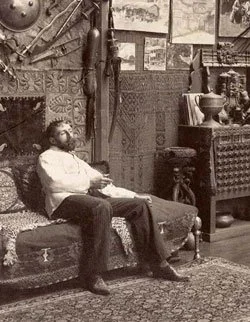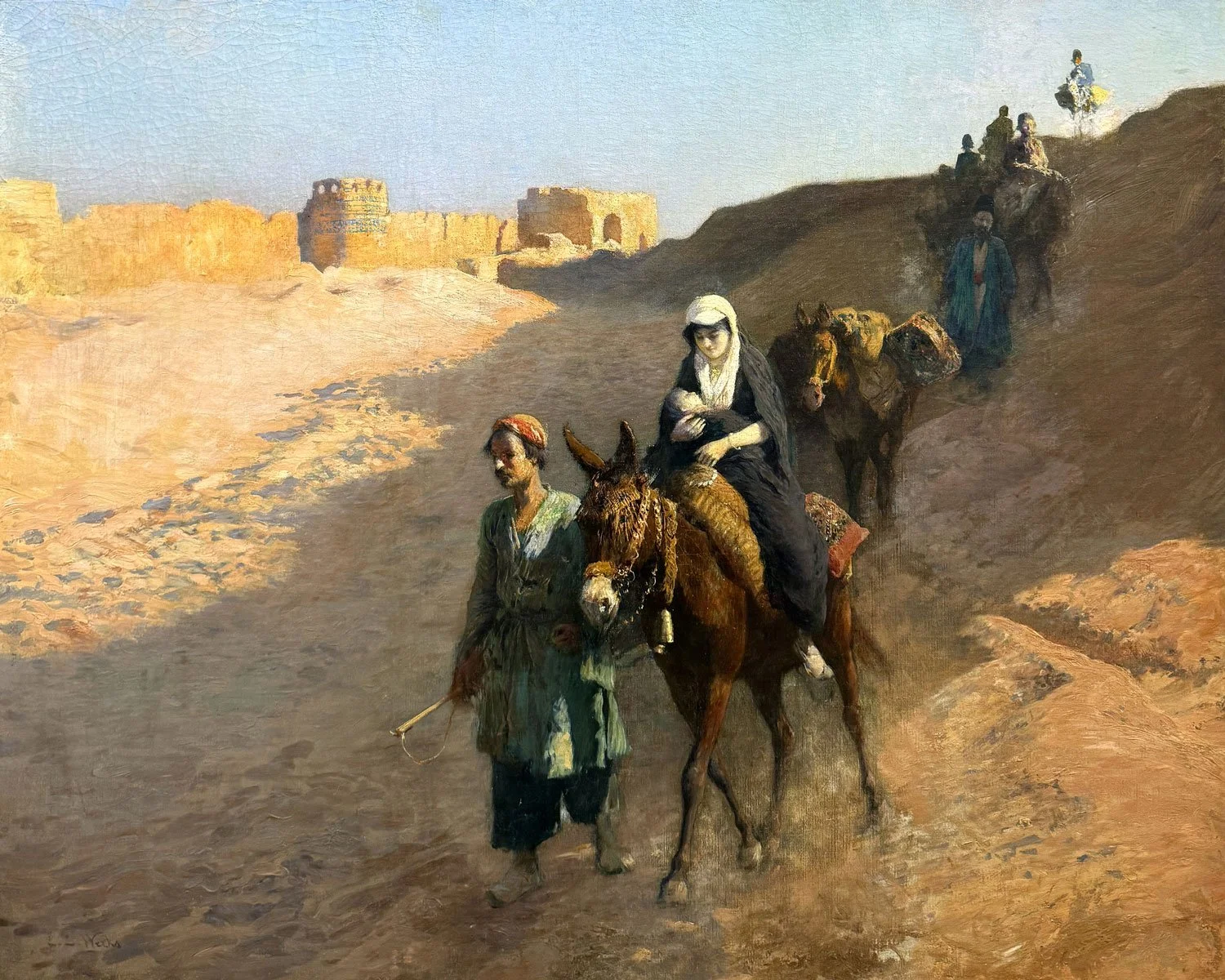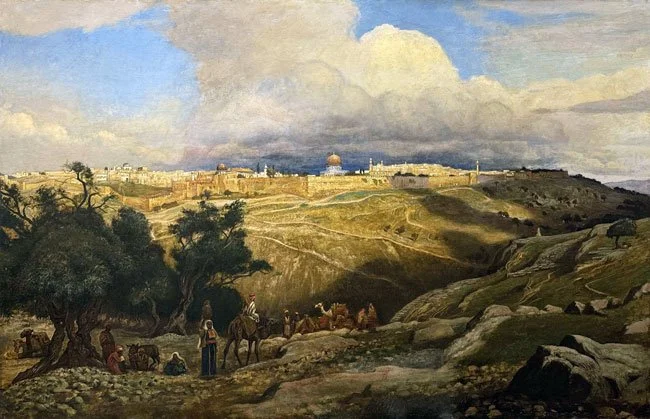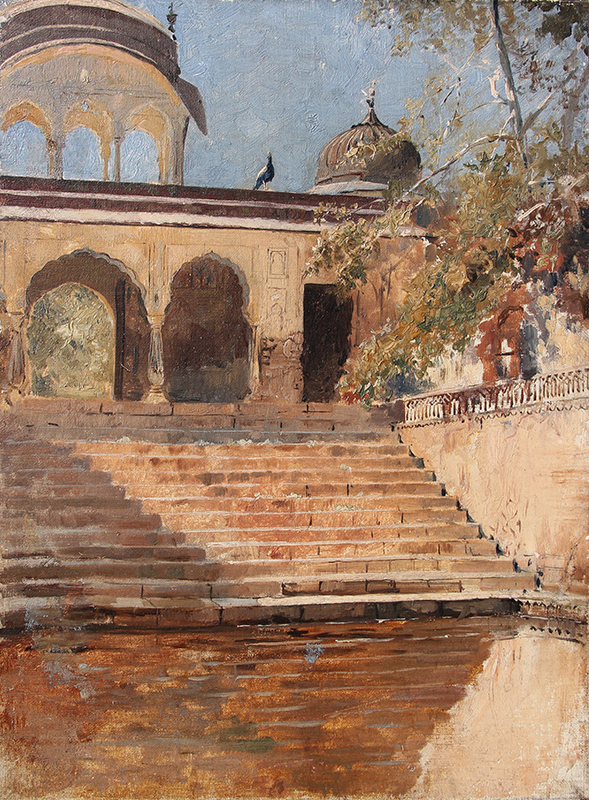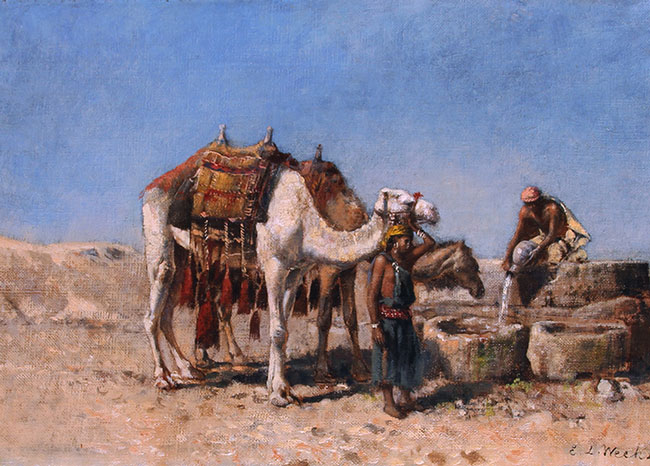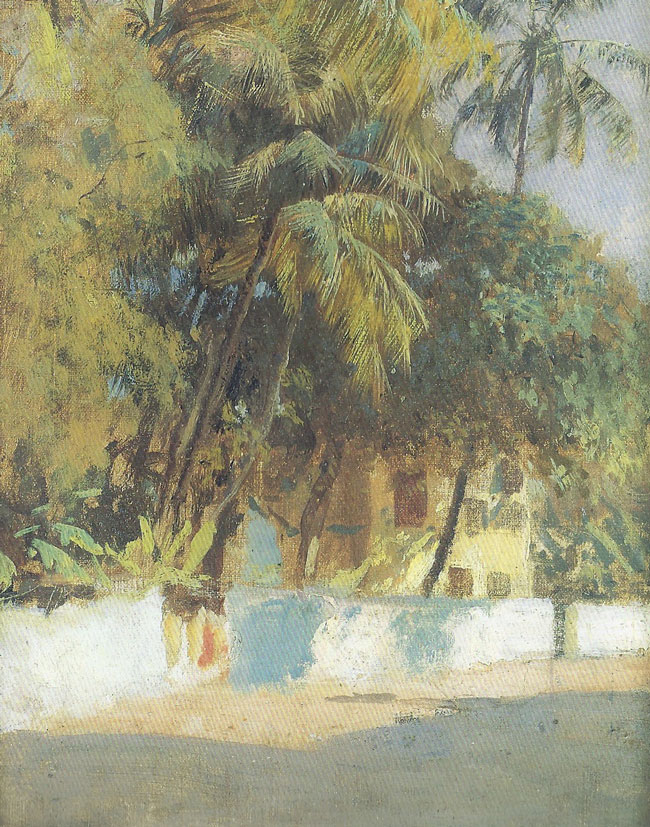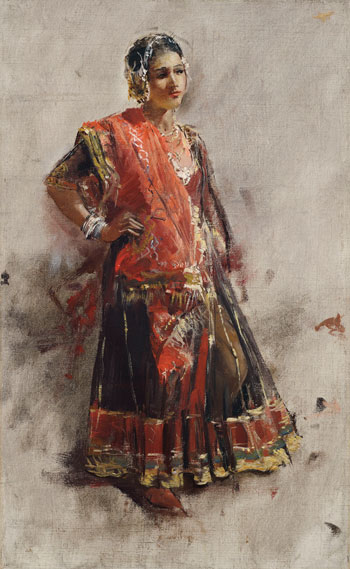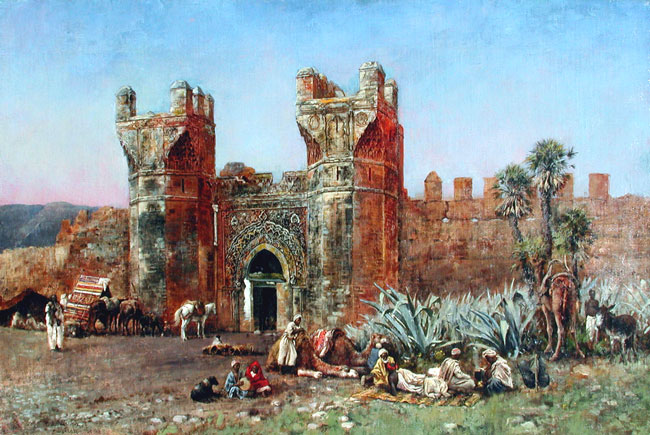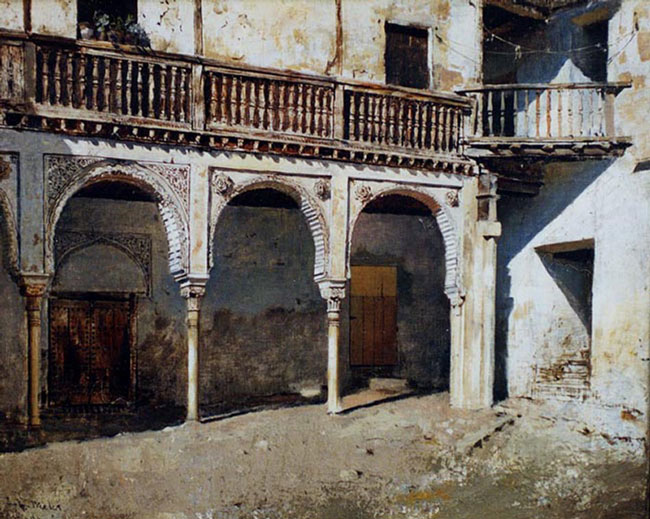EDWIN LORD WEEKS PAINTINGS FOR SALE & BIOGRAPHY
EDWIN LORD WEEKS
American, 1849–1903
BIOGRAPHY
Edwin Lord Weeks was born in Boston to Stephen and Mary Lord Weeks and raised in Newtonville, Massachusetts. His father was an established merchant in Boston, with an emporium on Tremont Street, “which specialized in imported coffees, teas, cigars, fruits, and other exotic merchandise [which] may have helped imbue young Weeks with the spirit of faraway places. Having apparently developed an interest in art at an early age, his full-time application to painting seems to have begun in 1870 when he opened a small studio in Newtonville, near Boston. In September 1871 he married his seventeen-year-old cousin, Frances Rollins Hale, from Rollinsford, New Hampshire, and spent time that year painting in the Florida Keys. The next year found him even further afield, in Surinam, on the northeast coast of South America.
“Weeks first crossed the Atlantic in 1872, spending some time in Paris, before traveling to the Near East in the company of a friend, the illustrator A.P. Close, who fell ill and died while on the trip. A good number of dated drawings and watercolors by Weeks survive from this journey, which included stops in Egypt, Syria, Lebanon, and Palestine. By March 1873, Weeks seems to have returned to Boston, where he exhibited some Egyptian sketches at the Boston Art Club. In September he was described at work on a ‘Mohammedan dervish at prayer,’ which along with other works created that summer, were scheduled to be shown at the fall opening of the Elliot, Blakeslee & Noyes Gallery, one of the city’s principal commercial galleries. By 1874 Weeks had gained the full attention of Boston art critics and in May and June of that year, there appeared many notices of paintings he either exhibited at the Boston Art Club or offered for sale through the trade.” [Ulrich W. Hiesinger, ed., Edwin Lord Weeks: Visions of India (Exhibition catalogue), Vance Jordan Fine Art Inc., New York, 2002, pp. 13-14].
On September 27, 1874, Weeks registered at the École des Beaux-Arts in the atelier of the most celebrated of the French Orientalist painters, Jean-Léon Gérôme (1824-1904). Following some months of instruction under Gérôme, Weeks went on to study with Léon Bonnat (1833-1922) and he preferred to be known as a student of Bonnat, and indeed labeled himself ‘élève de M. Bonnat’ in the Salon exhibition catalogues until the end of his life. As Heisinger notes, “In his use of color, Weeks was one of the few American painters to profit from the recent experiments of the Spanish Roman school, and he did so in part through Bonnat’s example. As Weeks always took pains to point out, Bonnat was not a traditional Frenchman, but rather a Basque by birth, and he was Spanish by training, having studied in Madrid under Federico Madrazo (1815-1894). Weeks viewed Bonnat as a Spanish painter, placing him within the one contemporary European school noted for its experimental use of brilliant color… Weeks described himself as a ‘colorist’ in art, and avoided the term ‘Orientalist.’ By doing so, he chose to define his work in terms of its artistic treatment rather than its subject matter.” [Heisinger, pp. 15-16].
Weeks continued to travel extensively throughout the rest of his life, with extensive time spent in Morocco in the late 1870s. But his three trips to India were to be the most important of his life and career. His first trip lasted from October 1882 until May 1883. “We are best informed about his final trip of 1892-93, which he described initially in a series of articles for Harper’s New Monthly Magazine, and then in a book entitled From the Black Sea through Persia and India, published in 1895. Although the latter purports to be a continuous narrative, the section dealing with India actually summarizes his experiences over an entire decade of intermittent travels there… Weeks’s overland tour to India in 1892-93 was the last of his voyages into unchartered territories. In the following decade he remained active as a painter and travel writer but relied on past journeys or more familiar terrain within Europe…
“As the influence of the Paris Salon waned, Weeks became a frequent exhibitor in the various international art exhibitions held throughout Europe, where he was duly rewarded, winning gold medals in Berlin (1891) and in Dresden and Munich (both 1897). In addition, Weeks was made a chevalier of the French Legion of Honor in 1896 and received the Order of St. Michael from the government of Bavaria in 1898. A special medal and prize was awarded to him for his exhibition of seventy-eight works at the Empire of India Exhibition held in London in 1895. A sale show, it was the closest he came to a large retrospective during his lifetime, although a select showing of nine of his prizewinning pictures was held in St. Louis in the early months of 1903…
“Weeks died at the age of fifty-four on November 16, 1903, after a lingering illness. It was reported at the time of his death that he had been ill for the previous year or two, the result, it was believed, of fevers contracted in India… In his last moments he told his wife that he wished to go to his studio, purportedly with the idea that being among his beloved pictures would serve as a tonic. He died that evening in the studio at about 10 o’clock in the midst of his paintings…
“A postscript to Weeks’s career occurred a year and a half later with the auction sale of his studio contents over a three-day period, March 15-17, 1905. In all 277 drawings and paintings were put up for sale. These included sketches, studies, and material intended for illustration, as well as some of his largest and most famous pictures, among them The Last Voyage, The Golden Temple of Amritsar, The Return of the Imperial Court from the Great Mosque at Delhi, in the Reign of Shah Jahan - Seventeenth Century, and Indian Barbers - Saharanpore. Mrs. Weeks, who had arranged the sale , made a gift of The Last Voyage to the Metropolitan Museum of Art.” [Heisinger, pp. 23-24; 45; 48-49].
Weeks’s sheer delight in the exploration of peoples and places infuses his studies, finished paintings, and each of his multiple articles published in Harpers Magazine and elsewhere. He writes of the Indian city of Ahmedabad: “To an amateur of new impressions there is no amusement more fascinating than to wander aimlessly about and lose himself in the mazes of a new Oriental City. One knows beforehand what to expect of Venice, of Cairo, of Damascus, and one may be sure of sitting down to just such a table d’hôte and with the same menu as in Paris. But Ahmedabad is like the city of a dream, as it has never been made familiar to us by painters or described in guide-books. It does not matter where one goes, every street shows us something strange” (“Street Life in India,” Harpers New Monthly Magazine, August 1890, p. 462). Weeks does exactly what he says in this passage, makes this “city of a dream,” Ahmedabad, familiar to his audience back in Paris, or London, or New York – he conveys the glorious light of India, the haphazard chaos of Indian life with animals and people inextricably sharing the same temple steps, the bathing ghats, the rivers and hills.
Weeks saw India at the height of the Raj and depicted the palaces and luxuriant life of the Rajahs with as much eye for detail as he would devote to a side street in a rural village. Queen Victoria had assumed the title Empress of India in 1877, just five years before the first of his three Indian trips. The Empire of India Exhibition in London in 1895 included major prize-winning works by Weeks – he was caught up in the maelstrom of a sweeping western fascination with all things Indian. Kaiser Wilhelm of Germany bought Weeks’s monumental and sumptuous depiction of the Rajah of Jodhpur in Berlin in 1891 (now in the collection of the Nationalgalerie, Staatliche Museen, Berlin); and his works were similarly acquired for the French nation, and when his works were dispersed at his estate sale in New York in 1905, American museums such as the Metropolitan Museum followed suit.
Museum Collections
Abraham Lincoln Foundation of the Union League of Philadelphia
Annmary Brown Memorial, Providence, RI
Appleton Museum of Art, Ocala, FL
Art Institute of Chicago, Chicago, IL
Brooklyn Museum of Art, Brooklyn, NY
Butler Institute of American Art, Youngstown, OH
Corcoran Gallery, Washington, DC
Dallas Museum of Art, Dallas, TX
Joslyn Art Museum, Omaha, NE
Los Angeles County Museum Art, Los Angeles, CA
Metropolitan Museum of Art, New York, NY
Musée d’Art et d’Industrie, Roubaix
Musée d’Orsay, Paris
Museo Thyssen-Bornemisza, Madrid
Nationalgalerie, Staatliche Museen zu Berlin
Newton History Museum, MA
Pennsylvania Academy of the Fine Arts, Philadelphia, PA
Philadelphia Museum of Art, Philadelphia, PA
Portland Museum of Art, Portland, ME
San Diego Museum of Art, CA
Sheffield Museums, Sheffield
Smithsonian American Art Museum, Washington, DC
Syracuse University Art Galleries, Syracuse, NY
Telfair Museum of Art, Savannah, GA
Virginia Museum of Fine Arts, Richmond, VA
Walters Art Gallery, Baltimore, MD
Mark Murray Fine Paintings is a New York gallery specializing in buying and selling 19th century and early 20th century artwork.
Please contact us if you are interested in selling your Edwin Lord Weeks paintings or other artwork from the 19th century and early 20th century.
Edwin Lord Weeks: An Appreciation
Touch below to watch the movie
EDWIN LORD WEEKS
Paintings for sale
Edwin Lord Weeks Paintings Previously Sold
EDWIN LORD WEEKS
A Portico in Ahmedabad, India
Oil on canvas
21¾ x 18½ inches (55.2 x 47 cm.)
SOLD
EDWIN LORD WEEKS
Along the Ghats, Mathura
Oil on board
16½ x 23 inches (42 x 58.3 cm)
SOLD
EDWIN LORD WEEKS
Two Nautch Girls
Oil on canvas
23 x 18¼ inches (58.5 x 46.3 cm.)
SOLD
EDWIN LORD WEEKS
Les Éléphants du Rajah de Jodhpore
Oil on canvas
18½ x 22 inches (47 x 55.9 cm)
SOLD
EDWIN LORD WEEKS
Two Hindu Men - India
Oil on canvas
20¾ x 13 inches (52.5 x 33 cm.)
SOLD
EDWIN LORD WEEKS
Sacred Lake, Bombay
Oil on board
10½ x 8¾ inches (26.6 x 22.3 cm)
SOLD
Additional Edwin Lord Weeks Paintings Previously Sold
EDWIN LORD WEEKS
At the Barber’s
Oil on canvas
24 x 37 inches (61 x 94 cm)
SOLD
EDWIN LORD WEEKS
Camels at a Well, Tangiers
Oil on canvas
10½ x 15½ inches (26.6 x 39.3 cm)
SOLD
EDWIN LORD WEEKS
Street Scene, Bombay
Oil on canvas laid down on board
10¾ x 8¾ inches (27.3 x 22.3 cm.)
SOLD
EDWIN LORD WEEKS
Temples and Steps – Benares, India (1883)
Oil on canvas
18½ x 28 inches (47 x 71 cm.)
SOLD
EDWIN LORD WEEKS
Study of a Man
Oil on canvas
13½ x 9½ inches (34.2 x 24 cm.)
SOLD
EDWIN LORD WEEKS
View in Benares
Oil on board
12 x 18 inches (30.5 x 45.6 cm.)
SOLD
EDWIN LORD WEEKS
A Distinguished Visitor
Oil on canvas
18¼ x 15 inches (46.4 x 38 cm.)
SOLD
EDWIN LORD WEEKS
Palanquin and Bearers - Agra
Oil on canvas
20 x 24 inches (50.8 x 61 cm.)
SOLD
EDWIN LORD WEEKS
Indian Dancing Girl
Oil on canvas
16 x 9¾ inches (41 x 24.8 cm)
SOLD
EDWIN LORD WEEKS
Procession beneath the Palace of Man Singh, Gwalior
Charcoal on paper
18 x 22 inches (45.7 x 55.9 cm.)
SOLD
EDWIN LORD WEEKS
The Rajah's Elephant
Oil on board
11½ x 6¾ inches (29.5 x 17.2 cm.)
SOLD
EDWIN LORD WEEKS
In the Bazaar, Oudeypore
Oil on canvas board
14 x 18 inches (35.5 x 45.7 cm)
SOLD
EDWIN LORD WEEKS
Rialto Bridge, Venice
Oil on board
8½ x 10½ inches (21.6 x 26.7 cm)
SOLD
EDWIN LORD WEEKS
Elephants of Bekanir
Oil on canvas
13 x 20 inches (33 x 51 cm)
SOLD
EDWIN LORD WEEKS
At the Gate of Shelah - ‘Past and Present’
Oil on canvas
24 x 36 inches (61 x 91.4 cm.)
SOLD
EDWIN LORD WEEKS
Man in Armor
Oil on canvas
18½ x 12½ inches (47 x 31.7 cm.)
SOLD
EDWIN LORD WEEKS
Camels and Caravan
Oil on board
11 x 18¼ inches (28 x 46.4 cm.)
EDWIN LORD WEEKS
A Venetian Canal
Oil on canvas
13 x 16 inches (33 x 40.6 cm.)
SOLD
EDWIN LORD WEEKS
Bombay
Oil on board
8¾ x 10½ inches (22.2 x 26.7 cm.)
SOLD
EDWIN LORD WEEKS
Shops in Native Quarter—Lahore, India
Oil on canvas
20 x 12½ inches (50.8 x 31.7 cm.)
SOLD
EDWIN LORD WEEKS
Watering Horses on the Euphrates
Oil on board
10¼ x 16¼ inches (26 x 41 cm.)
SOLD
EDWIN LORD WEEKS
Interior of La Torre des Infantas, The Alhambra
Oil on canvas
10 x 12¼ inches (25.4 x 30.5 cm)
SOLD
EDWIN LORD WEEKS
Temples and Bathing Ghat - Benares, India
Oil on canvas
18½ x 28 inches (47 x 71 cm.)
SOLD
EDWIN LORD WEEKS
Elephant belonging to the Maharajah of Bikanir
Oil on canvas
20 x 13 inches (51 x 33 cm.)
SOLD
EDWIN LORD WEEKS
Love-making at Oodeypore
Oil on canvas
26 x 37 inches
SOLD
EDWIN LORD WEEKS
Scene at Salé, Morocco
Oil on canvas
24 x 36 inches (61 x 91.4 cm.)
SOLD
EDWIN LORD WEEKS
Courtyard in Granada
Oil on canvas
18¾ x 23½ inches (47.6 x 59.7 cm.)
SOLD
EDWIN LORD WEEKS
Woman in Yellow
Oil on canvas
20 x 12¼ inches (50.8 x 31 cm.)
SOLD
EDWIN LORD WEEKS
Palace and Lake at Sarkeh, near Ahmedabad, India
Oil on canvas
20½ x 30½ inches (52 x 77.5 cm.)
SOLD
EDWIN LORD WEEKS
In the Native Quarter - Ahmedabad
Oil on canvas
12 x 16 inches (30.5 x 40.6 cm.)
SOLD
EDWIN LORD WEEKS
Ramparts du Quartier du Ondais, Rabat (1879)
Oil on canvas
12 x 19½ inches (30.5 x 50 cm.)
SOLD
EDWIN LORD WEEKS
Persian Mother and Child
Oil on board
11½ x 19 inches (29.2 x 48.2 cm.)
SOLD
EDWIN LORD WEEKS
A Seated Zouave
Oil on canvas
18 x 11½ inches (45.7 x 29 cm.)
SOLD
EDWIN LORD WEEKS
Study of a Man in a Red Cap (c. 1892)
Oil on canvas
15 x 9½ inches (38 x 24 cm.)
SOLD
EDWIN LORD WEEKS
Native Gharry, Ahmedabad (1882)
Oil on canvas
20½ x 30½ inches (52 x 77.4 cm)
SOLD
For more information on Edwin Lord Weeks see these additional resources:
WikiArt: http://www.wikiart.org/en/edwin-lord-weeks

